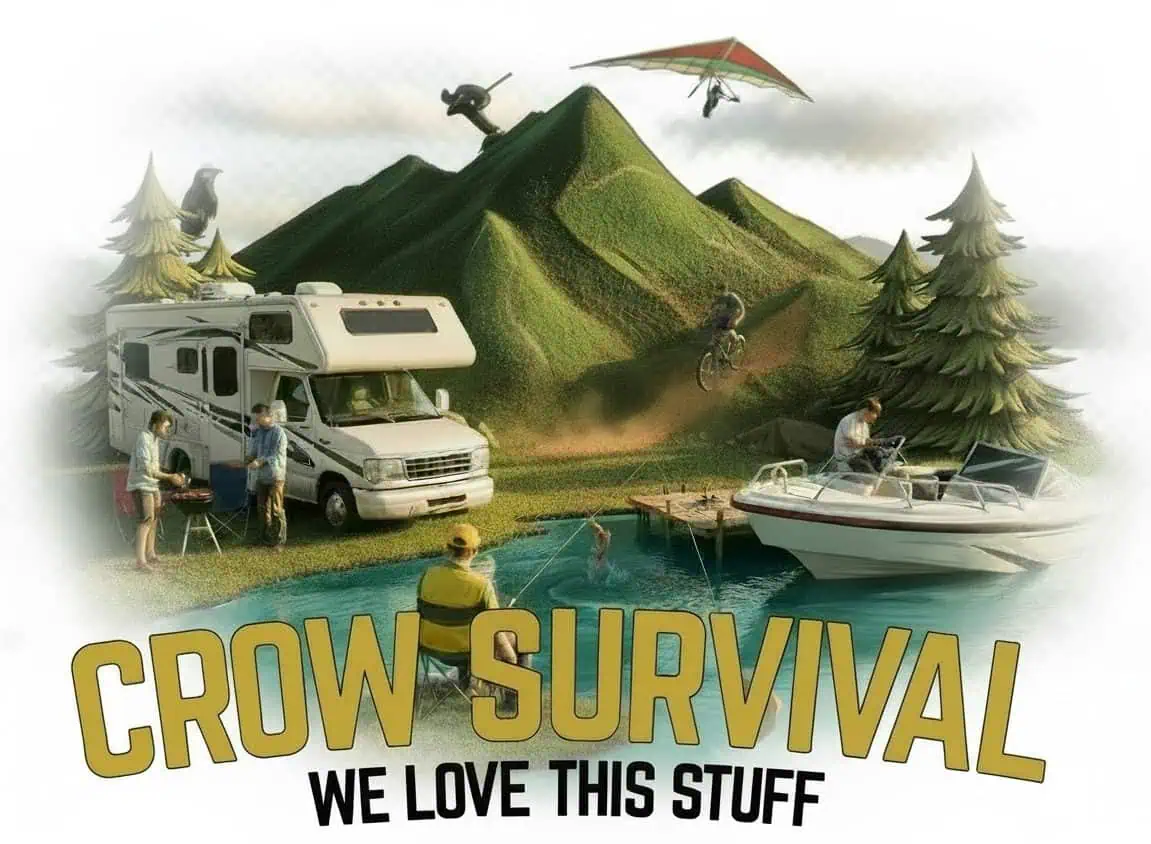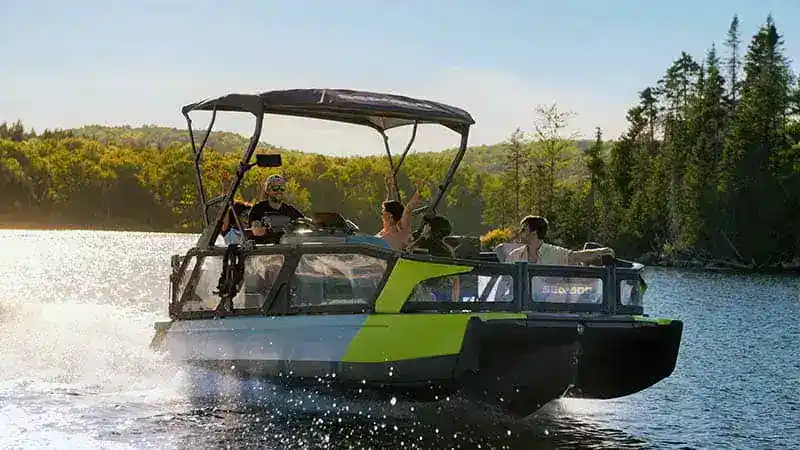
Thank you for reading our post, please rate this article at the end.
Reading Time: 7 minutesLast Updated on December 16, 2025 by Paul Clayton
Table of Contents
The Ingredients To Working With Your 24/7/365 RV Life
Key Takeaways
-
- Necessity of Income: Unless substantial savings are available, securing a consistent income is crucial for sustaining a full-time RV lifestyle.
- High-Demand Remote Work: The most flexible and lucrative options are telecommuting and IT consultation, often taking 3-9 month contracts with high earning potential.
- Portable Conventional Careers: Full-time employment is possible for professionals in fields that require regular relocation, such as travel nurses or pipeline workers, who follow contracts or projects.
- Workamping as Supplement: Workamping (or camp hosting) is a popular method to supplement income, offering a free campsite and hookups in exchange for office or maintenance labor.
- Internet is the Main Challenge: Reliable internet access is the toughest part of remote RV work, requiring an investment in multiple unlimited data plans (e.g., Verizon, AT&T) because park Wi-Fi is generally unreliable.
- Hidden Costs and Planning: Remote RV life introduces added expenses, including the need for redundant power (inverter, generator), multiple data plans, and a proactive strategy for health insurance and detailed expense tracking.
One of the challenges of transitioning to full-time RV living is how to sustain your RV life. See, unless you’ve enough savings, finding a way to make a living is crucial if you plan to spend your life on the road.
Fortunately, there are endless possibilities for earning income while living in an RV. I’ve been a full-time camper, working remotely for the past six years, and I’ll share some of the options RVers should consider to earn a living while on the road.
Can You Rent an RV for a Year?
Full-Timing Conventional Jobs
Many RVers I know are self-employed or can work from home, and travel a lot, so working from an RV or on the road is effortless for them.
However, I’ve also met other RVers who work full-time jobs and live in an RV. Typically, the most popular category of RVers with this lifestyle is those in the oil or gas industry. I’m sure there are others, but that’s what I’ve encountered. Pipeline workers, such as welders, follow work from place to place. They may stay in an area for a few months and then move out when the project is done.
I’ve also met travel nurses who take contracts in hospitals, then travel to warmer/cooler regions and take another contract.
So, whatever career you’re in, you shouldn’t let your work obligations limit your urge to live in an RV.
The key to living in an RV for your 9 5 job is finding a place you like staying for an extended period, especially if you need to make a long-term commitment. You must be more thorough than the typical RVer when researching the park’s rules, policies, layout, etc.
I suggest you visit a park in person before making a full booking and see if you can gather information from other campers about their experience with the park.
In short, don’t have a cavalier attitude when choosing your RV spot or assume you’ll adapt to anything. The minor annoyance you can tolerate as a short-term camper becomes too much to endure over time for full-time RVers.
Workamping
If you don’t have a 9-5 job that will allow you to work on the road, you could work full-time in an RV and be a camp host at a local state park. It’s also known as workamping.
Workamping is any camp job providing free campsite and hookups in exchange for your labor. I know many RVers who have taken work camping to supplement other income streams.
So, what does a workamper day look like?
I’ve managed a private camp, and here’s what we expected from workampers and gave in return. For office workers, we asked that you be personable, friendly, have some basic computer knowledge, and be willing to learn.
For maintenance workers, we asked that you’d be willing to get your hands dirty if needed. For example, a sewer line might burst, or someone might miss their dump tank, and all that would need fixing or cleaning. If you were planning to stay for several seasons, we asked that you get trained with basic hands-on skills such as plumbing or carpentry.
On the other hand, we would compensate our workers with a free campsite, electricity, propane, and free laundry. Of course, there are other terms and policies you need to adhere to. The perks may also vary depending on the campsite.
Check workamper.com for workamping opportunities. They’ve daily postings for jobs at campgrounds. Some are short-term and seasonal, but most require living on-site.
However, I’ve found better success calling or visiting the parks in person. It works better if you plan to stay there and offer services.
 IT Consultation
IT Consultation
IT consulting is one department that is increasingly becoming popular with remote RVers. It’s flexible in terms of where and when you can work, making it a great career field for RVers seeking to share their expertise in the IT world.
A couple of my RVing friends are IT consultants who work full-time. They generally take contracts that last anywhere from 3-9 months. On average, their income is $60 to $100, depending on the nature of the project.
Telecommuting Jobs
Telecommuting jobs are the dream job for most RVers. I have the luxury of being classified as a “telecommuter” employee. I occasionally still go to the physical offices, but the job is made simpler if I can complete my work assignments from home using the internet and phone connection.
What I can tell you about companies offering telecommuting jobs is that you need to show that you’re a valuable employee, your skill set is in high demand, and the job requires you to move around.
Remote Jobs
A remote job requires you to be in front of a computer and doesn’t require you to attend in-person meetings.
I’ve been a remote worker since 2017, and it helped us when we went full-time in an RV. The good thing about remote jobs is that, as long as I have a stable internet connection to sustain conference calls and transfer files at a reasonable rate, I can work from anywhere.
We work remotely, and Upwork has excellent job boards where you can find remote jobs for full-time RV living.
Some of the remote jobs that many RVers are doing are:
- Software engineering
- Copywriting
- Customer service
- Account management
- Graphic design
- Day trading (stock & crypto)
- Health insurance advisor
- IT profession
- RV inspectors
- Teaching
- Web design
 How Much Do RVers Earn?
How Much Do RVers Earn?
Generally, income will vary greatly depending on each individual, and earning potential will depend on your skill set and ability to work remotely.
The income disparity among RVers working remotely is huge and highly personalized, and I can’t put an exact figure on it.
However, some of the questions to think about when going full-time are:
- What are your monthly/annual income expectations?
- What’s your budget?
- Will you boondock or require hookups the majority of the time?
- Will you take out a loan for your RV?
What’s Working on the Road Like?
Telecommuting is what most RVers love, especially those planning to work full-time. However, you generally need some special skill set and/or your own company.
You must also understand that telecommuting jobs come with their own set of challenges. For example, your career choice will dictate the state in which you’ve residency (corporate tax issues), and you can be penalized or fired if you’re unavailable.
Depending on the career, you may also find out that you don’t have enough flex time as you imagined. For example, I telecommute for a large tech company and work 40-50 hours weekly. It’s enough for our salary and health insurance, but I’ve no free time and am only available for specific hours. It also requires me to be 110% available during the said hours.
Most remote jobs for RVers will also require internet during working hours. We average 2 to 3 GB daily, so we’re mostly limited to the high-cell coverage areas when RVing. It also means we have the added expense of multiple unlimited data plans.
The other expense of working remotely is that you must have redundant power options in case of an emergency. Sometimes, power may go out, or we may fail to reach the park. Having a generator and an inverter to power our laptops and other devices is critical.
Health time insurance is also another thing to keep in mind. Other running expenses include RV repairs, utilities, maintenance, etc. I always track all my expenses in a detailed spreadsheet for easier budgeting.
Despite all the challenges, the opportunity to travel is worth the additional expenses of contingency plans.
Internet
The Internet is by far the toughest part of full-time remote work. See, you can rely on a Park’s internet connections. Most suck, and park managers know little to nothing about how to operate them.
It’s frustrating to drive for miles on end to a park, only to find the park doesn’t have coverage as you had hoped for. While satellite-based internet can solve the issue, the latency in data transmission means you can’t perform some tasks, such as video conferencing or Skype. Expect constant frustration.
I recommend getting a mix of unlimited data plans. For example, I’ve Verizon, AT&T, Sprint, Karma Wifi, and FreedomPop, and I usually switch when needed.
I also have an iOS app, Call Coverage. It does a great job of informing where there’s supposed to be coverage of major carriers.
Where and How to Get Remote Jobs
There are several ways to get remote jobs. You could apply to any job boards that provide remote job opportunities.
But my favorite method is polishing my LinkedIn profile. Set your state to seeking remote jobs, upload your resume, and select all the settings to filter your job search. And when starting, give preference to jobs with an “easy apply” tag.
Final Thoughts
I strongly believe you can accomplish anything if you make it your main focus and motivation. If you really want to start working remotely as a full-time RVer, you need to gather information about work opportunities for RVers.
Watch YouTube videos of the same, join Escapees, attend RV shows, and make friends with other RVers already living your desired life.
It’s also important to consider your budget and see what you can cut to finance your goal and make it happen.
Home page
Back to the top of the page







